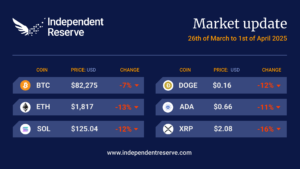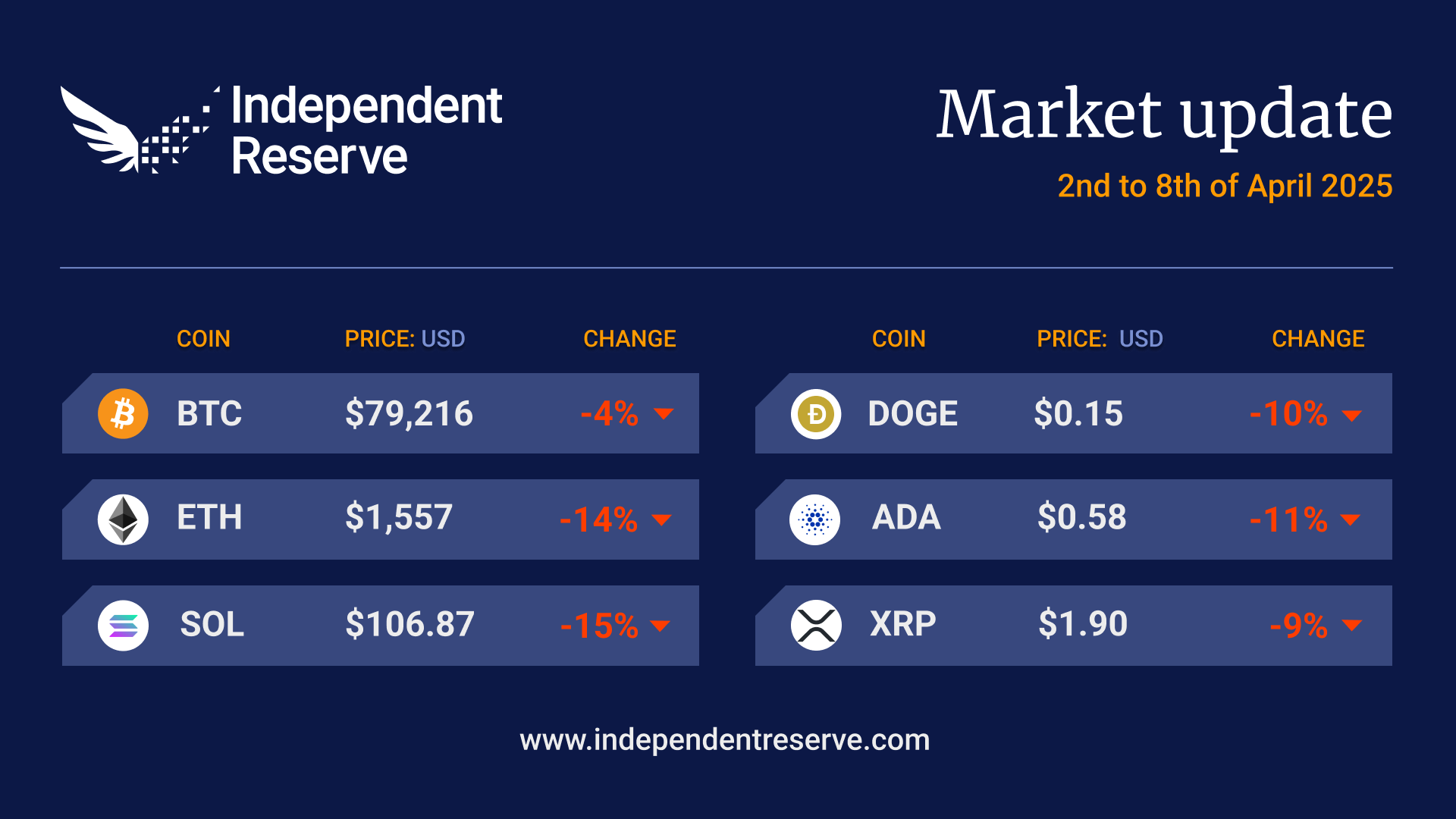In Markets
It’s April 1, meaning we can finally say goodbye to the worst quarter for the Bitcoin price since 2018, and the worst quarter for Ethereum since 2018. The price plunge seems mostly due to macroeconomic factors, with the Tesla chart mirroring Ethereum’s and US stocks recording their worst quarter relative to the rest of the world in 23 years. The ASX is also down 4% this year. February’s US core inflation came in above expectations at 2.8%, and consumer spending is growing by just 0.4%. The big worry is President Donald Trump’s looming ‘Liberation Day’ tariff announcements, which The Kobeissi Letter claims “will be the biggest escalation of the trade war to date. Markets are in for a wild week.” Crypto trading volumes are down 70% from the peak, and the total market cap has declined from A$5.94 trillion (US$3.9T) to A$4.26T (US $2.67T). One potential bright spot is that FTX has begun to repay creditors it owes more than A$80K (US$50K) this week. Bitcoin finishes the week down 6% to trade around A$131,763 (US$82,275), while Ethereum lost another 12% to trade around A$2,910 (US$1,817). Everything else was down, including XRP (-15%), Solana (-11%), Dogecoin (-11%) and Cardano (-10%). The Crypto Fear and Greed Index is at 34 or Fear.

From the OTC Desk
Market overview
- Tariff narrative: The theme of the week has been the fear of a global trade war, which may lead to a recession. President Trump intends to unveil country-based tariffs on April 2 and will also impose reciprocal tariffs to match the duties that other countries charge on U.S. products. Global equity markets continued to show signs of strain, with the NASDAQ Composite Index closing at 17,300, down from 18,270 the week before. Gold displayed properties of a safe haven amidst the risk-off sentiment, rising to record all-time highs of US$3,133 per oz.
- IPO frenzy: USDC Stablecoin Issuer Circle enlisted the help of JP Morgan and Citi ahead of its plan to IPO in 2025, intending to file in late April. Custodian BitGo, as well as some cryptocurrency exchanges, have also revealed plans to go public this year or the next.
- Corporates buying the dip: Strategy, formerly known as MicroStrategy, bought another 22,048 BTC for US$1.9B, taking its total holdings to 528,185 BTC. Tokyo-based Metaplanet issued US$13.3M in new bonds to buy more bitcoin, with CEO Simon Gerovich commenting that the firm was “buying the dip.”
OTC desk activity
- Seeing some small buy flows for BTC and ETH.
- More sell-side flow for stablecoins.
Key Economic Calendar Events (AEDT)
- Tuesday, 1 Apr, 3:30 p.m.: RBA Interest Rate Decision (Consensus: 4.1%)
- Wednesday, 2 Apr, 1:00 a.m.: U.S. ISM Manufacturing PMI (Consensus: 49.5)
- Thursday, 3 Apr, 11:30 a.m.: AU Balance of Trade (Consensus: 5.6B)
- Friday, 4 Apr, 1:00 a.m.: U.S. ISM Services PMI (Consensus: 53)
- Friday, 4 Apr, 11:30 p.m.: U.S. Non-Farm Payrolls (Consensus: 128K)
- Friday, 4 Apr, 11:30 p.m.: U.S. Unemployment Rate (Consensus: 4.2%)
- Saturday, 5 Apr, 2:25 a.m.: Fed Chair Powell Speech
For any further information, please feel free to reach out.
In Headlines
BlackRock on tokenisation
BlackRock chair Larry Fink’s annual letter is very bullish on crypto and tokenisation. “Every stock, every bond, every fund—every asset—can be tokenised. If they are, it will revolutionise investing,” he wrote. That’s potentially good news for Ethereum, which has accounted for the vast majority of BlackRock’s BUIDL funds to date. Fink also said the astonishing growth of US debt meant the US dollar’s global reserve status was under threat from Bitcoin.
Ethereum hard fork at the end of the month
Ethereum’s next hard fork Pectra looks like going ahead on April 30, following the success of the third Hoodi testnet trial run. Two previous testnet dress rehearsals for Pectra on Holesky and Sepolia testnets had issues finalising, so the devs will have breathed a sigh of relief when the latest testnet fork went off without a hitch in about 30 minutes. Pectra has a heap of upgrades and improvements, but for ordinary users, the big one is a one-click upgrade to account abstraction, which turns their ordinary account into a smart account with heaps of user-friendly features. In other ETH news, there’s a big increase in validators queuing up to join the Beacon Chain, which some suggest is indicative of preparations by the ETFs to add staking.
Buterin’s three-proof system
Ethereum creator Vitalik Buterin has put out a new blog suggesting a roadmap tweak for ETH. He proposes the introduction of a multi-proof system using optimistic and zero-knowledge proofs alongside trusted execution environment (TEE) provers. If any two out of three agree then a transaction will be finalised. The idea is to balance speed, robustness and decentralisation and reduce the risks associated with a single-proof method. Separately, Buterin also trialled out new privacy pools on Ethereum, which gives good actors privacy while shutting out money launderers.
Ten days of Bitcoin ETF inflows
After giving back all their year-to-date gains recently, the Bitcoin ETFs recorded ten positive inflow days in a row, albeit taking in a “relatively modest” US$1.06B, according to Min Jung of Presto. “While institutions are not aggressively risk-on, there is still demand for bitcoin exposure in the market,” Jung said. Sadly, the streak came to an end on March 28 with a US$93.2 million outflow, all of it from Fidelity. The Ethereum ETFs saw very little activity last week with US$8.7M outflows.
Long slow bleed?
Quinn Thompson, founder of crypto hedge fund Lekker Capital predicts Trump’s tariff war will see a long slow bleed for crypto markets over months, with Bitcoin headed under US$60K. He said this would be “very painful and shocking” but that Trump’s policies to reign in the debt and government spending and his tariff war will hurt the US economy for six to nine months. Arca CIO Jeff Dorman offers the counter view however that “crypto is just about the only industry in all of financial markets that is NOT affected in any way by tariffs” and argues that digital assets are “quite recession proof.”
AUSTRAC warning on crypto ATMs
The Australian Transaction Reports and Analysis Centre (AUSTRAC) has placed crypto ATM operators “on notice” over money laundering and scam concerns. “We want to ensure crypto ATM providers have robust practices to minimise the risk that their machines can be used to launder dirty money or to scam and defraud innocent people,” said AUSTRAC CEO Brendan Thomas. Australia now has 1,648 crypto ATMs, up from just 23 in 2019.
BitMEX founders pardoned
Donald Trump issued surprise pardons to the three co-founders of crypto exchange BitMEX who pled guilty to violating anti-money laundering provisions in the Bank Secrecy Act back in 2022. Arthur Hayes, Benjamin Delo and Samuel Reed join Silk Road founder Ross Ulbricht as prominent crypto figures pardoned by Trump, with FTX founder Sam Bankman Fried no doubt crossing his fingers that he could be next. He’s been courting the Right with an appearance on Tucker Carlson, although the unsanctioned interview saw him thrown in solitary and he’s since been moved to a transit facility.
Controversial DeFi rules overturned
The US Senate voted 70-28 this week to overturn a controversial crypto tax rule that would have required DeFi providers to operate like traditional securities brokers and collect and report user trading data. The Internal Revenue Service cooked up the rule a few weeks before Trump took office, but the repeal gained bipartisan support.
GameStop’s Bitcoin reserve
Covid-era meme stock GameStop revealed plans to raise US$1.3 billion to invest in Bitcoin as a reserve asset, mirroring Michael Saylor’s Strategy. Company CEO Ryan Cohen posted a picture of a meeting with Saylor earlier this year. Traditional investors didn’t love the plan, with GME stock tanking 25% the next day, however, GameStop had also disclosed it will be shutting down a “significant number of stores”. Meanwhile, Strategy has just bought another 22,000 Bitcoin.
Web3 funding surges in Singapore
According to the Singapore: the Unchain State 2025 report, Web3 has emerged as a key driver of Internet development in recent years. In the first half of 2024, Web3 projects based in Singapore attracted more than half of all fintech funding—securing US$742 million out of a total US$1.16 billion across 83 deals. Crypto adoption is also growing, particularly among younger and higher-income individuals, with Bitcoin (62%) and Ethereum (43%) ranked as the most popular assets.
Web3 funding surges in Singapore
According to the Singapore: the Onchain State 2025 report, Web3 has emerged as a key driver of Internet development in recent years. In the first half of 2024, Web3 projects based in Singapore attracted more than half of all fintech funding—securing US$742 million out of a total US$1.16 billion across 83 deals. Crypto adoption is also growing, particularly among younger and higher-income individuals, with Bitcoin (62%) and Ethereum (43%) ranked as the most popular assets.
Yield bearing stablecoins
JP Morgan predicts that yield-bearing stablecoins will grow from their current 6% share to account for 50% of the stablecoin market. The top five yield-bearing stablecoins — Ethena’s USDe, Sky Dollar’s USDS, BlackRock’s BUIDL, Usual Protocol’s USD0 and Ondo Finance’s USDY — have rapidly grown from US$4B to over US$13B since the election in November.
Until next week, happy trading!


